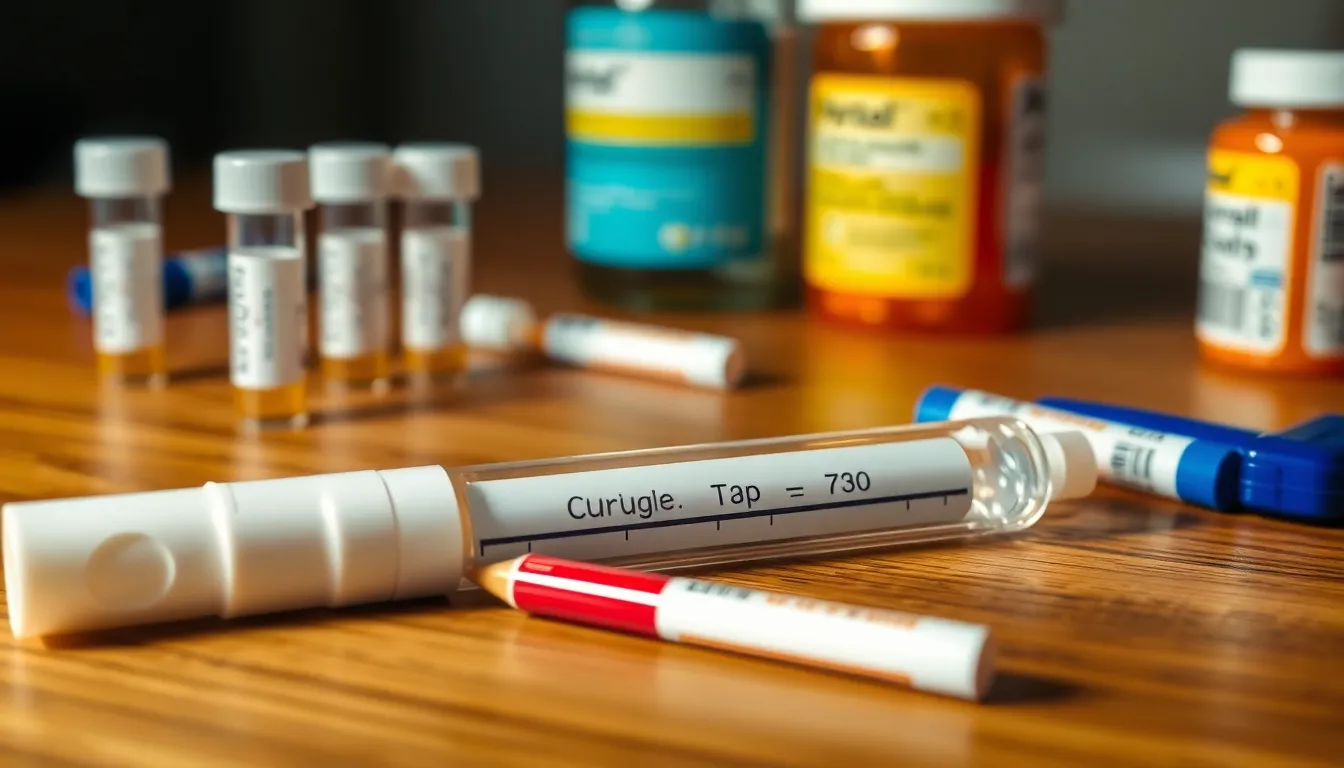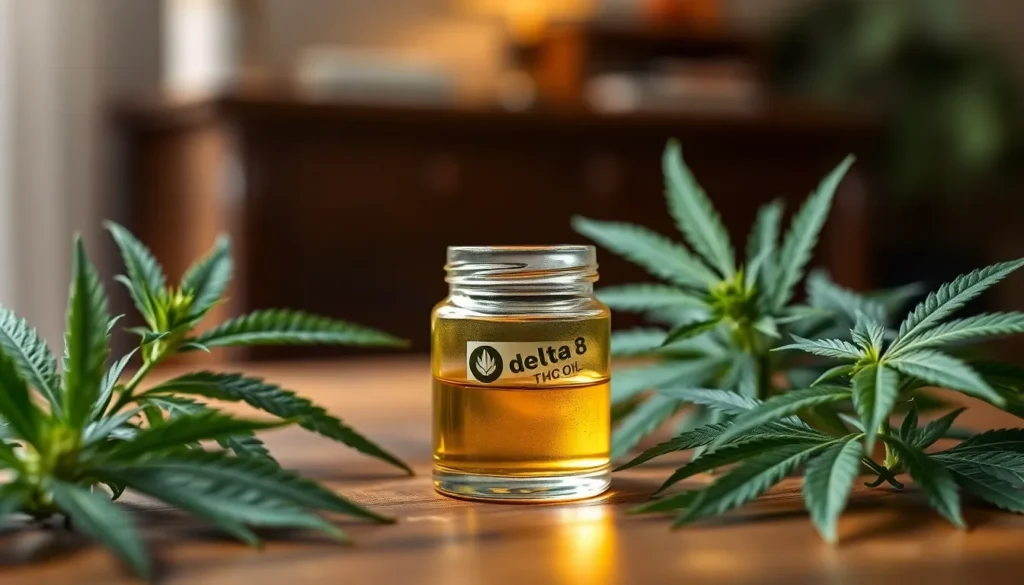Table of Contents
ToggleIn a world where cannabis products are evolving faster than a cat meme goes viral, Delta 8 THC has captured the spotlight. But with great buzz comes great confusion. Does Delta 8 really show up as THC on drug tests? If you’ve ever wondered whether your chill vibe could lead to an unexpected surprise, you’re not alone.
Picture this: you’re enjoying a relaxing evening with Delta 8, feeling all the good vibes, but then you remember that pesky drug test lurking around the corner. Is it time to panic or can you keep calm and carry on? Understanding how Delta 8 interacts with testing can save you from a sticky situation. Let’s dive into the THC mystery and uncover the truth about Delta 8’s stealthy behavior in the world of drug screenings.
Understanding Delta 8 THC
Delta 8 THC has gained significant attention in recent years due to its unique properties. The confusion regarding its detection in drug tests makes it essential to understand its characteristics.
What Is Delta 8 THC?
Delta 8 THC, a cannabinoid derived from hemp, offers psychoactive effects similar to Delta 9 THC. This compound is less potent, resulting in a milder high. Many users report experiencing reduced anxiety and enhanced focus when using Delta 8. Its legal status varies across states, adding to the complexity of usage. Research indicates Delta 8 THC may have therapeutic potential, yet more studies are needed to confirm these benefits.
The Differences Between Delta 8 and Delta 9 THC
Differences between Delta 8 and Delta 9 THC stem from their chemical structures. Delta 8 features a double bond on the eighth carbon atom, while Delta 9 has that bond on the ninth carbon atom. This minor variation largely influences their effects on the body. Delta 8 tends to produce a smoother experience with fewer side effects compared to Delta 9, which can induce higher levels of anxiety or paranoia in some users. Additionally, Delta 9 THC is more prevalent in the cannabis plant, leading to broader recognition and research compared to Delta 8. Understanding these differences aids consumers in making informed choices regarding their cannabis use.
Drug Testing and THC

Drug tests primarily screen for substances present in the body, commonly including THC, which might also lead to confusion about Delta 8 THC. Understanding the mechanisms behind these tests can help users navigate potential risks.
How Drug Tests Work
Drug tests analyze samples, like urine, saliva, or blood, to detect the presence of specific metabolites. THC metabolizes in the body to produce various compounds. Some of these compounds, while linked to Delta 9, may also arise from Delta 8 use. Tests typically target the presence of THC metabolites, which can result in positive results regardless of the source.
Types of Drug Tests Used
Employers or organizations may utilize several drug test types. Urine tests rank as the most common, as they detect THC up to 30 days after consumption, depending on frequency of use. Saliva tests provide instant results but typically detect THC for a shorter period. Blood tests, while less common, can indicate recent use and detect THC back to 1-2 days afterward. Understanding these options emphasizes the likelihood of Delta 8 showing up as THC in tests.
Does Delta 8 Show Up as THC?
Delta 8 THC may show up as THC on drug tests due to its chemical similarities with Delta 9 THC. Both compounds belong to the cannabinoid family, leading to potential confusion during screenings.
The Science Behind Delta 8 Detection
Detection of Delta 8 THC in drug tests stems from its metabolism in the body. Once ingested, Delta 8 converts into similar metabolites as Delta 9 THC, which are targeted by standard drug tests. These tests primarily search for THC-COOH, a major metabolite of THC present in the body. Since Delta 8 and Delta 9 share structural similarities, drug tests typically cannot differentiate between the two. Consequently, consuming Delta 8 may result in positive test results for THC.
Factors Influencing Drug Test Results
Various factors influence the likelihood of a positive drug test result. Frequency of use plays a significant role; regular users may retain THC metabolites longer in their systems. The type of test also matters, as urine tests can detect THC metabolites for up to 30 days post-consumption. Additionally, body fat percentage affects THC storage, with higher body fat potentially leading to longer detection times. Individual metabolism rates further diversify results, as some metabolize substances quicker than others. Lastly, hydration levels at the time of testing can impact concentration levels of THC in the urine.
Implications for Users
Understanding the implications of Delta 8 THC consumption is essential for informed choices. Users must consider both legal factors and practical recommendations to mitigate risks.
Legal Considerations
Delta 8 THC’s legal status varies by state. Some states classify it as legal within the confines of the 2018 Farm Bill, while others impose strict regulations or outright bans. Enforcement varies, making it critical for users to check their local laws. Ignorance of the law can lead to unintended legal repercussions. Consulting legal resources or professionals may provide clarity on Delta 8 regulations in specific jurisdictions.
Recommendations for Delta 8 Users
Users should prioritize knowledge regarding testing protocols. Knowing that Delta 8 can result in a positive THC test outcome is vital. Consumption timing and frequency directly influence testing results. It’s wise to abstain from Delta 8 use before undergoing any drug testing. Staying hydrated and maintaining a healthy lifestyle can also benefit overall metabolism. Seeking products from reputable sources ensures quality and transparency in dosages. Users can enjoy their experience more securely by adhering to these recommendations.
Delta 8 THC presents a unique experience for users but comes with potential risks regarding drug testing. Its chemical structure closely resembles that of Delta 9 THC, leading to the possibility of positive test results. Users should remain informed about their consumption habits and the legal landscape surrounding Delta 8.
Understanding the nuances of drug testing and the factors that influence results is crucial. By staying educated and cautious, individuals can make better choices about their use of Delta 8 THC, ensuring a safer experience while navigating the complexities of cannabis consumption.







